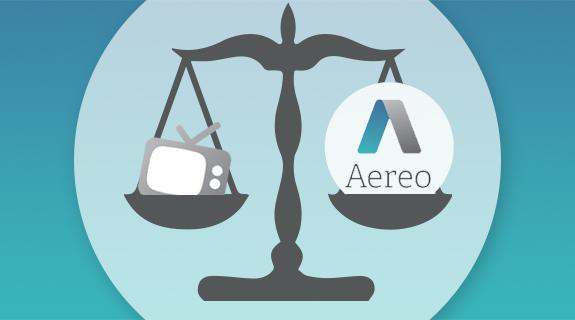Aereo: It's Over Now - Shelly Palmer

After months of debate and speculation , the U.S. Supreme Court on Wednesday ruled against internet TV service Aereo in a 6-3 decision. The decision was a win for broadcasters that argued Aereo violated their copyright. Even though lesser courts had sided with Aereo, the Supreme Court saw it differently, effectively killing Aereo (at least in its current form).
"It's over now," said Barry Diller, whose company IAC led a $20.5 million funding for Aereo in 2012. Diller said Aereo "did try" but has said in the past that there is " no Plan B" if the Supreme Court rules against Aereo.
21st Century Fox said the ruling was "a win for consumers that affirm important copyright protections." Aereo's founder and CEO Chet Kanojia said the ruling is "a massive setback for the American consumer" and that it sends a "chilling message to the technology industry." Aereo says it will continue to fight, but the definitive ruling leaves them with little room to operate.
My good friend, Gary Shapiro, CEO of the Consumer Electronics Association, wrote that the ruling "is a disappointment for startups, consumers and proponents of technological progress" as "more and more of us are demanding the ability to view TV programming on our own tablets and smartphones, not just our TVs."
The Supreme Court's ruling directly affected a very small slice of the current TV landscape. Aereo, which launched in 2012 in NYC, is only available in 13 cities and only has about 100,000 subscribers. However, its ramifications for the future are much, much greater – especially considering that in 36 months, more people will be watching primetime television programming online than on broadcast TV. This ruling delays the inevitable – and helps broadcasters keep their heads in the sand.
What the Ruling Means for Broadcasters
The Supreme Court's ruling against Aereo helps keep the status quo for broadcasters and major networks – which is exactly what they wanted. Major networks were threatening to pull their stations off the air and move to subscription-only if Aereo had won – they said Aereo would create a blueprint that would eventually let cable providers stop paying retransmission fees. (They were right about that specific point).
The ruling is also a win for the NFL and MLB, both of which said Aereo exploited their copyrighted telecasts and both had threatened to move their games to cable if Aereo was deemed legal.
Les Moonves, CEO of CBS, says the ruling means broadcasters can stay in business: "We will continue to do the same high-quality, premium programming that we've done and we will deliver it. This is a pro-consumer thing."
What the Ruling Means for You
Even if you weren't an Aereo subscriber, the ruling limits your TV options – and brings into question other cloud-based products you may be using.
Aereo aimed to disrupt cable. Diller said Aereo offered an "alternative to the bundle" that consumers are forced to accept from cable providers.
"It's not a big [financial] loss for us, but I do believe blocking this technology is a big loss for consumers," he said. "I salute Chet Kanojia and his band of Aereo'lers for fighting the good fight."
The ruling is a blow for cord-cutters – both the ones who have already given up on cable and the ones who planned to do so in the near future. It eliminates an inexpensive option to get live TV on their computers, alongside other subscription services like Netflix and Hulu Plus.
A sea change is coming in the broadcast world. Consumers are unhappy with the expensive (and restrictive) subscription models cable and satellite providers are offering. The most recent yearly survey from Temkin Group found support for all of the largest pay TV providers had fallen in the past year. The survey also showed that these pay TV providers were the second worst in customer satisfaction across the 43 industries; the only companies that fared worse were internet service providers.
As Gary Shapiro wrote, the ruling also means that "the migration away from local programming in favor of new alternatives offered by HBO, Netflix, Amazon, YouTube and other innovators in the content and delivery space will continue." Our expectation of TV is WiWWiWWiW (What I want, When I want, Where I want). Aereo offered broadcast TV that fit that model; traditional broadcasters do not.
What the Ruling Means for the Rest of the Tech World
The bigger fear is that a ruling against Aereo could disrupt and endanger cloud computing – where storing videos and other content on remote servers is the name of the game. Justice Stephen Breyer said the ruling should not affect cloud-based content services or companies (like Google, Microsoft or Dropbox), but that could still be a future battleground.
Could these services such as Box, Dropbox and Google Drive, be next on the chopping block? The types of services that let you stream copyrighted materials stored on a server – like music, books and movies – in exactly the same manner as the technology Aereo was using. Aereo is afraid of these consequences – that's the "chilling message" Kanojia spoke about.
"We know what the Supreme Court intends to do, which is to say [Aereo] is illegal and nothing else, at least presumptively, is," said Jessica Litman, a professor at the University of Michigan's law school. However, "there's a bunch of ambiguity in the attempted carve-out of cloud storage services."
The Future of Aereo and TV
Aereo doesn't have the revenue to pay the retransmission fees major broadcast networks do. It also doesn't have the money to begin an expensive legal battle. It's likely this is the end of the road for Aereo, unless it completely re-works its business model – which seems antithetical to the basis for the company.
"If broadcasters won't adapt to what we as viewers want," writes Gary Shapiro, "they will continue to face challenges from disruptive innovators like Aereo." Let's hope so. I would hate to think that this ruling in inhibits innovation in any way. But, only time will tell.
Shelly Palmer is Fox 5 New York's On-air Tech Expert (WNYW-TV) and the host of Fox Television's monthly show Shelly Palmer Digital Living. He also hosts United Stations Radio Network's, Shelly Palmer Digital Living Daily, a daily syndicated radio report that features insightful commentary and a unique insiders take on the biggest stories in technology, media, and entertainment. He is Managing Director of Advanced Media Ventures Group, LLC an industry-leading advisory and business development firm and a member of the Executive Committee of the National Academy of Television Arts & Sciences (the organization that bestows the coveted Emmy® Awards). Palmer is the author of Television Disrupted: The Transition from Network to Networked TV 2nd Edition (York House Press, 2008) the seminal book about the technological, economic, and sociological forces that are changing everything, Overcoming The Digital Divide: How to use Social Media and Digital Tools to Reinvent Yourself and Your Career; (York House Press, 2011) and Digital Wisdom: Thought Leadership for a Connected World (York House Press, 2013). For more information, visit shellypalmer.com.
Palmer Digital Living Daily, a daily syndicated radio report that features insightful commentary and a unique insiders take on the biggest stories in technology, media, and entertainment. He is Managing Director of Advanced Media Ventures Group, LLC an industry-leading advisory and business development firm and a member of the Executive Committee of the National Academy of Television Arts & Sciences (the organization that bestows the coveted Emmy® Awards). Palmer is the author of Television Disrupted: The Transition from Network to Networked TV 2nd Edition (York House Press, 2008) the seminal book about the technological, economic, and sociological forces that are changing everything, Overcoming The Digital Divide: How to use Social Media and Digital Tools to Reinvent Yourself and Your Career; (York House Press, 2011) and Digital Wisdom: Thought Leadership for a Connected World (York House Press, 2013). For more information, visit shellypalmer.com.
Read all Shelly's MediaBizBloggers commentaries at Shelly Palmer Report.
Check us out on Facebook at MediaBizBloggers.com
Follow our Twitter updates @MediaBizBlogger
The opinions and points of view expressed in this commentary are exclusively the views of the author and do not necessarily represent the views of MediaBizBloggers.com management or associated bloggers. MediaBizBloggers is an open thought leadership platform and readers may share their comments and opinions in response to all commentaries.


